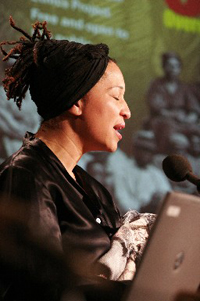Slave Lullabies
Slave Lullabies in the American South: Mothers' Voices Recovered
Songs From The Slave Narratives
A Note On The Language Of The Narratives
Other Songs From The Slave Narratives
More Listening: Musical Collections
More Reading: Books And Articles On Folk Music, African American Music, And Songs For Children

Slave Lullabies in the American South:
Mothers' Voices Recovered
For slave women in the American South, motherhood was no simple joy; it was an experience of inconceivable ambivalence. On the plantation, enslaved women had little say in whether, when and how they would become mothers. Some were impregnated by their owners and some raised their owner's children, being forced to lavish time and care on the master's babies rather than their own. For these women, motherhood was about bearing African American children who were property and raising white children who were their masters.
In spite of their hardships, these women managed to respond creatively to the terrible conflict that marked their role as mothers, in which parental love could not flow unmixed with bitterness. As is often the case in African-American culture, music allowed for survival. Slave songs about mothering open a window into these women's hearts. Many of these lullabies have come down to us as words only—their tunes are lost—but they resonate nevertheless. Their lyrics reveal an ever-present sense of danger and pain; they whisper sweet promises of a brighter future; and, as lullabies have always done, they serve the practical purpose of making children "sleep good, feel better and have something to hope for," as one writer recalls her grandmother telling her.
This section of the website is devoted to the musical expression of mothering under enslavement in the American South. It focuses on the genre of the lullaby explored through oral history, printed sources and recordings of folk music. Some of these songs may seem familiar, and that's because we have inherited them from a dark time in American history, transmitted down through the generations by scholars, folk singers, moviemakers and other artists.
Compiled by
Judith Tick
Senior Research Analyst, Feminist Sexual Ethics Project
Melissa J. de Graaf
Research Analyst, Feminist Sexual Ethics Project